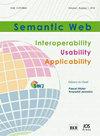LinkedDataOps:quality oriented end-to-end geospatial linked data production governance
IF 2.9
3区 计算机科学
Q2 COMPUTER SCIENCE, ARTIFICIAL INTELLIGENCE
引用次数: 0
Abstract
This work describes the application of semantic web standards to data quality governance of data production pipelines in the architectural, engineering, and construction (AEC) domain for Ordnance Survey Ireland (OSi). It illustrates a new approach to data quality governance based on establishing a unified knowledge graph for data quality measurements across a complex, heterogeneous, quality-centric data production pipeline. It provides the first comprehensive formal mappings between semantic models of data quality dimensions defined by the four International Organization for Standardization (ISO) and World Wide Web Consortium (W3C) data quality standards applied by different tools and stakeholders. It provides an approach to uplift rule-based data quality reports into quality metrics suitable for aggregation and end-to-end analysis. Current industrial practice tends towards stove-piped, vendor-specific and domain-dependent tools to process data quality observations however there is a lack of open techniques and methodologies for combining quality measurements derived from different data quality standards to provide end-to-end data quality reporting, root cause analysis or visualisation. This work demonstrated that it is effective to use a knowledge graph and semantic web standards to unify distributed data quality monitoring in an organisation and present the results in an end-to-end data dashboard in a data quality standards-agnostic fashion for the Ordnance Survey Ireland data publishing pipeline.LinkedDataOps:面向质量的端到端地理空间关联数据生产治理
这项工作描述了语义网标准在爱尔兰测绘局(OSi)架构、工程和施工(AEC)领域的数据生产管道数据质量治理中的应用。它说明了一种数据质量治理的新方法,该方法基于为跨复杂、异构、以质量为中心的数据生产管道的数据质量度量建立统一的知识图谱。它提供了由四个国际标准化组织(ISO)和万维网联盟(W3C)数据质量标准定义的数据质量维度的语义模型之间的第一个全面的形式化映射,这些标准由不同的工具和利益相关者应用。它提供了一种方法,可以将基于规则的数据质量报告提升为适合聚合和端到端分析的质量度量。目前的工业实践倾向于使用炉管式、特定于供应商和领域的工具来处理数据质量观察,然而,缺乏将来自不同数据质量标准的质量测量相结合的开放技术和方法,以提供端到端的数据质量报告、根本原因分析或可视化。这项工作表明,使用知识图谱和语义网标准来统一组织中的分布式数据质量监控,并以数据质量标准不可知的方式在端到端数据仪表板中呈现结果,对于爱尔兰地形测量局数据发布管道是有效的。
本文章由计算机程序翻译,如有差异,请以英文原文为准。
求助全文
约1分钟内获得全文
求助全文
来源期刊

Semantic Web
COMPUTER SCIENCE, ARTIFICIAL INTELLIGENCEC-COMPUTER SCIENCE, INFORMATION SYSTEMS
CiteScore
8.30
自引率
6.70%
发文量
68
期刊介绍:
The journal Semantic Web – Interoperability, Usability, Applicability brings together researchers from various fields which share the vision and need for more effective and meaningful ways to share information across agents and services on the future internet and elsewhere. As such, Semantic Web technologies shall support the seamless integration of data, on-the-fly composition and interoperation of Web services, as well as more intuitive search engines. The semantics – or meaning – of information, however, cannot be defined without a context, which makes personalization, trust, and provenance core topics for Semantic Web research. New retrieval paradigms, user interfaces, and visualization techniques have to unleash the power of the Semantic Web and at the same time hide its complexity from the user. Based on this vision, the journal welcomes contributions ranging from theoretical and foundational research over methods and tools to descriptions of concrete ontologies and applications in all areas. We especially welcome papers which add a social, spatial, and temporal dimension to Semantic Web research, as well as application-oriented papers making use of formal semantics.
 求助内容:
求助内容: 应助结果提醒方式:
应助结果提醒方式:


